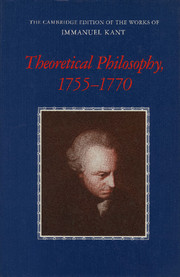Book contents
- Frontmatter
- Contents
- General editors' preface
- Preface
- Guide to abbreviations
- General introduction
- Introductions to the translations
- Résumés of the works
- A NEW ELUCIDATION OF THE FIRST PRINCIPLES OF METAPHYSICAL COGNITION (1755)
- THE EMPLOYMENT IN NATURAL PHILOSOPHY OF METAPHYSICS COMBINED WITH GEOMETRY, OF WHICH SAMPLE I CONTAINS THE PHYSICAL MONADOLOGY (1756)
- AN ATTEMPT AT SOME REFLECTIONS ON OPTIMISM (1759)
- THE FALSE SUBTLETY OF THE FOUR SYLLOGISTIC FIGURES (1762)
- THE ONLY POSSIBLE ARGUMENT IN SUPPORT OF A DEMONSTRATION OF THE EXISTENCE OF GOD (1763)
- Preface
- Section 1 In which is furnished the argument in support of a demonstration of the existence of God
- Section 2 Concerning the extensive usefulness peculiar to this mode of proof in particular
- Section 3 In which it is shown that there is no other possible argument in support of a demonstration of the existence of God save that which has been adduced
- ATTEMPT TO INTRODUCE THE CONCEPT OF NEGATIVE MAGNITUDES INTO PHILOSOPHY (1763)
- INQUIRY CONCERNING THE DISTINCTNESS OF THE PRINCIPLES OF NATURAL THEOLOGY AND MORALITY (1764)
- M. IMMANUEL KANT'S ANNOUNCEMENT OF THE PROGRAMME OF HIS LECTURES FOR THE WINTER SEMESTER 1765 — 1766 (1765)
- DREAMS OF A SPIRIT-SEER ELUCIDATED BY DREAMS OF METAPHYSICS (1766)
- CONCERNING THE ULTIMATE GROUND OF THE DIFFERENTIATION OF DIRECTIONS IN SPACE (1768)
- ON THE FORM AND PRINCIPLES OF THE SENSIBLE AND THE INTELLIGIBLE WORLD [INAUGURAL DISSERTATION] (1770)
- Factual notes
- Bibliographies of editions and translations
- Glossary
- Biographical-bibliographical sketches of persons mentioned by Kant
- Index
Section 3 - In which it is shown that there is no other possible argument in support of a demonstration of the existence of God save that which has been adduced
Published online by Cambridge University Press: 18 December 2014
- Frontmatter
- Contents
- General editors' preface
- Preface
- Guide to abbreviations
- General introduction
- Introductions to the translations
- Résumés of the works
- A NEW ELUCIDATION OF THE FIRST PRINCIPLES OF METAPHYSICAL COGNITION (1755)
- THE EMPLOYMENT IN NATURAL PHILOSOPHY OF METAPHYSICS COMBINED WITH GEOMETRY, OF WHICH SAMPLE I CONTAINS THE PHYSICAL MONADOLOGY (1756)
- AN ATTEMPT AT SOME REFLECTIONS ON OPTIMISM (1759)
- THE FALSE SUBTLETY OF THE FOUR SYLLOGISTIC FIGURES (1762)
- THE ONLY POSSIBLE ARGUMENT IN SUPPORT OF A DEMONSTRATION OF THE EXISTENCE OF GOD (1763)
- Preface
- Section 1 In which is furnished the argument in support of a demonstration of the existence of God
- Section 2 Concerning the extensive usefulness peculiar to this mode of proof in particular
- Section 3 In which it is shown that there is no other possible argument in support of a demonstration of the existence of God save that which has been adduced
- ATTEMPT TO INTRODUCE THE CONCEPT OF NEGATIVE MAGNITUDES INTO PHILOSOPHY (1763)
- INQUIRY CONCERNING THE DISTINCTNESS OF THE PRINCIPLES OF NATURAL THEOLOGY AND MORALITY (1764)
- M. IMMANUEL KANT'S ANNOUNCEMENT OF THE PROGRAMME OF HIS LECTURES FOR THE WINTER SEMESTER 1765 — 1766 (1765)
- DREAMS OF A SPIRIT-SEER ELUCIDATED BY DREAMS OF METAPHYSICS (1766)
- CONCERNING THE ULTIMATE GROUND OF THE DIFFERENTIATION OF DIRECTIONS IN SPACE (1768)
- ON THE FORM AND PRINCIPLES OF THE SENSIBLE AND THE INTELLIGIBLE WORLD [INAUGURAL DISSERTATION] (1770)
- Factual notes
- Bibliographies of editions and translations
- Glossary
- Biographical-bibliographical sketches of persons mentioned by Kant
- Index
Summary
1. Classification of all possible arguments in support of a demonstration of the existence of God
The conviction of the great truth, There is a God, if it is to have the highest degree of mathematical certainty, has this peculiarity: it can only be reached by a single path. It confers on this reflection an advantage: once one is convinced that there is no choice possible among a variety of arguments, philosophical efforts will have to be united in a single argument. These endeavours will aim to correct mistakes which may have crept into the argument in the course of its elaboration, not to reject it.
With a view to showing this, I would begin by reminding the reader that he must not lose sight of the requirement which must actually be satisfied. What has to be proved, namely, is the existence, not merely of a very great and very perfect first cause, but of the Supreme Being who is above all beings. Furthermore, what has to be proved is the existence, not of one or more such beings, but of one unique such Being. And, finally, these things must be proved with mathematical certainty and not by appealing to grounds which are merely probable.
All arguments for the existence of God must derive from one or other of two sources: either from the concepts of the understanding of the merely possible, or from the empirical concept of the existent. In the first case, the argument may proceed either from the possible as a ground to the existence of God as a consequence, or from the possible as a consequence to the divine existence as a ground. In the second case, the argument may proceed from that, the existence of which we experience, to the existence merely of a first and independent cause, and then, by subjecting that concept to analysis, proceed to the derivation of its divine characteristics; alternatively, the argument may proceed directly from that which experience teaches us to both the existence and the properties of the Divine Being.
- Type
- Chapter
- Information
- Theoretical Philosophy, 1755–1770 , pp. 195 - 202Publisher: Cambridge University PressPrint publication year: 1992



